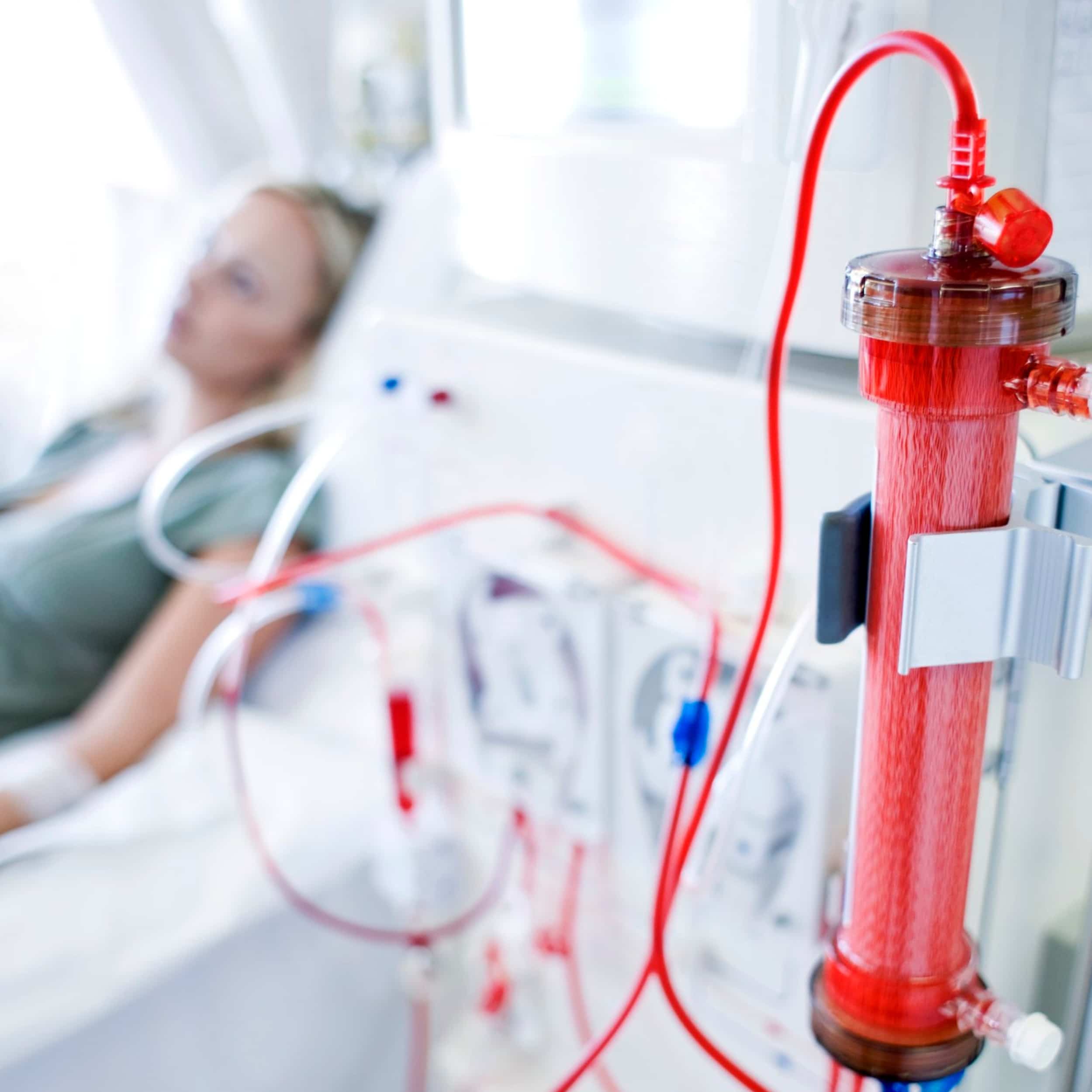Dialysis Effect on Body
Kidney dialysis is a lifesaving process that helps replace some of the function of your kidneys, and can extend your life with kidney failure.
That is perhaps the most important detail about dialysis to remember. It is also, however, good to know the facts about dialysis and what to expect if you are facing this treatment.
There are many unpleasant side effects of kidney dialysis that you might have to deal with. Preparation is key to just about everything, however, and being prepared and knowing what to expect can help you through this potentially difficult process.
Side effects for each person will vary, as well as the severity. Some people might have a terrible go of it, and suffer with harsh side effects, while others might not feel as bad.
Let’s look at the profound impact dialysis has on your body. It's more than a treatment—it alters your physical and emotional state, affects your cardiovascular system, and other bodily functions. You'll understand not only its short-term effects but long-term implications too.

Jump to:
- Key Takeaways
- Understanding the Dialysis Process
- Short-Term Effects of Dialysis on the Body
- Long-Term Impact of Dialysis
- Physical and Emotional Changes During Dialysis
- How Dialysis Influences the Cardiovascular System
- Dialysis and Its Impact on Blood Quality
- Nutritional Aspects to Consider During Dialysis
- Coping Strategies for Dialysis Patients
- FAQs for Side Effects of Kidney Dialysis
- Kidney Dialysis Can Be Tough On Your Body
Key Takeaways
- Dialysis has a profound impact on both physical and emotional health.
- There are several types of dialysis, each with unique functions and effects on the body.
- There are both short-term and long-term effects of dialysis which requires proper management.
- Coping with physical changes and the emotional impact of dialysis requires strategies such as exercise, sleep management, and support from healthcare providers and loved ones.
For More Recipes and Ideas --->> Get Your Free Meals and Recipes That Are Perfect for Pre-Dialysis Diets, Pre-Dialysis with Diabetes, or Dialysis Diets.
Understanding the Dialysis Process
Let’s have a quick overview of the fundamental aspects of dialysis, focusing on two primary methods: hemodialysis and peritoneal dialysis. As life-saving treatments for individuals battling kidney disease, these modalities play a pivotal role in maintaining health when natural kidney function falters.
Additionally, this section delves into the core processes involved in dialysis, shedding light on how each technique effectively filters toxins and excess fluids from the bloodstream. There are smart goals for chronic kidney disease as well, just make sure you have all information available.

Why Dialysis Is Necessary
Kidney failure, or End-Stage Renal Disease (ESRD), is a serious medical condition marked by the profound decline in kidney function at the advanced stages of chronic kidney disease (CKD).
In ESRD, the kidneys lose their ability to effectively filter waste products and excess fluids from the bloodstream. This results in the dangerous accumulation of toxins and disruptions in the body's fluid and electrolyte balance.
Patients with ESRD require dialysis as a vital medical intervention. Dialysis plays a crucial role in replicating the essential functions that healthy kidneys perform. It acts as an artificial substitute by:
Dialysis serves as a life-sustaining therapy for people with kidney failure. It steps in to compensate for the loss of kidney function, removing toxins, managing fluid balance, regulating electrolyte levels, and helping control blood pressure.
Without regular dialysis, ESRD is life-threatening, making it an indispensable treatment for those affected by this advanced stage of kidney disease.
Hemodialysis
Hemodialysis is a vital medical procedure employed to treat individuals with End-Stage Renal Disease or severe kidney dysfunction. This form of renal replacement therapy functions as an artificial kidney, performing the critical roles of waste removal and fluid balance regulation that natural kidneys typically handle.
The hemodialysis process occurs in specialized dialysis centers under the supervision of trained healthcare professionals.
During a hemodialysis session, a patient is connected to a hemodialysis machine, which includes a dialyzer—a device functioning as an artificial kidney. To begin, a vascular access point, usually created through a surgically placed fistula, graft, or catheter, allows blood to be withdrawn from the patient's body.
Inside the dialyzer, the patient's blood flows through a series of specialized filters, where waste products and excess fluids are removed. The cleaned blood is then returned to the patient's circulatory system.
Hemodialysis sessions typically last three to four hours and are often prescribed three times a week, although the frequency and duration may vary based on the patient's specific needs and the severity of their kidney disease.
Hemodialysis is highly effective at maintaining a patient's overall health by preventing the accumulation of toxins, regulating fluid balance, and managing electrolyte levels.
However, it requires consistent access to a dialysis center and imposes dietary restrictions. Additionally, patients must adhere to strict medication regimens to ensure optimal treatment outcomes (diet vs medication for CKD improvement).
Peritoneal Dialysis
Is peritoneal dialysis better than hemodialysis? Peritoneal dialysis (PD) is another valuable renal replacement therapy used to manage ESRD or severe kidney dysfunction. Unlike hemodialysis, which occurs in specialized centers, peritoneal dialysis can be performed by patients themselves in the comfort of their own homes, offering greater flexibility and independence.
The core principle of peritoneal dialysis involves utilizing the peritoneal membrane lining the abdominal cavity as a natural filter. A permanent catheter is surgically placed into the patient's abdomen, providing access to this cavity.
During a peritoneal dialysis exchange, a sterile dialysis solution, containing electrolytes and glucose, is introduced into the abdominal cavity through the catheter. The peritoneal membrane acts as a semipermeable barrier, allowing waste products and excess fluids from the bloodstream to pass into the dialysis solution.
After a prescribed dwell time, during which the solution absorbs toxins and excess fluids, the used dialysis solution is drained from the abdomen and replaced with fresh solution. This process is typically performed multiple times a day, with each exchange taking a few hours.
Continuous ambulatory peritoneal dialysis (CAPD) involves manual exchanges during the day, while automated peritoneal dialysis (APD) employs a machine for nocturnal exchanges, allowing for a more flexible treatment schedule.
Peritoneal dialysis offers several advantages, including the ability to maintain a more liberal diet and fluid intake compared to hemodialysis. It also eliminates the need for frequent trips to a dialysis center. However, it requires strict adherence to hygiene and catheter care to prevent infections.
Dialysis Types Comparison
When comparing treatment options, it's crucial to understand the differences between hemodialysis and peritoneal dialysis.
| Aspect | Hemodialysis (HD) | Peritoneal Dialysis (PD) |
| Treatment Location | Typically done in dialysis centers. | Can be done at home, providing greater independence. |
| Frequency | Usually requires three sessions per week. | Performed daily (continuous ambulatory PD) or nightly (automated PD), offering flexibility. |
| Vascular Access | Requires permanent access (fistula, graft, or catheter) for blood transfer. | Needs a permanent catheter surgically placed into the abdominal cavity. |
| Fluid and Diet Control | More restrictive; requires strict fluid and dietary management. | Allows for a more liberal diet and fluid intake. |
| Treatment Duration | Each session lasts 3-4 hours. | Daily exchanges take 30-40 minutes; nocturnal PD allows for overnight therapy. |
| Complications | Higher risk of vascular access-related infections. | Risk of peritonitis (abdominal infection) and catheter-related complications. |
| Travel | Requires planning around dialysis center availability. | Offers greater flexibility for travel. |
Pros and Cons:
Hemodialysis (HD):
- Pros: Efficient waste removal, skilled medical oversight, shorter daily time commitment, lower infection risk.
- Cons: Frequent sessions, dietary restrictions, limited independence, potential for intradialytic hypotension.
Peritoneal Dialysis (PD):
- Pros: Home-based, flexibility in scheduling, fewer dietary restrictions, reduced risk of blood access-related complications.
- Cons: Risk of peritonitis, daily commitment, potential weight gain due to dialysate, and limited suitability for some patients with abdominal issues.
Ultimately, the choice between HD and PD depends on individual patient preferences, lifestyle, and medical considerations, and a thorough evaluation by healthcare providers is crucial to determine the most suitable option.
Short-Term Effects of Dialysis on the Body
The short-term effects of dialysis are immediate and impactful aspects of renal replacement therapy that patients often experience during or shortly after treatment sessions.
As essential interventions for individuals with End-Stage Renal Disease, both hemodialysis and peritoneal dialysis can bring about notable physiological changes.
These effects encompass adjustments in fluid balance, blood pressure, electrolyte levels, and overall well-being. Understanding these short-term consequences is crucial for patients, healthcare providers, and caregivers, as it aids in optimizing treatment management, ensuring patient comfort, and mitigating potential complications associated with this life-sustaining therapy.
Identifying Short-Term Side Effects: Hemodialysis
Hemodialysis, a crucial treatment for End-Stage Renal Disease (ESRD), can lead to various short-term side effects or intradialytic complications that patients may experience during or immediately after a session. Some common side effects include:
- Hypotension (Low Blood Pressure): A rapid removal of excess fluid during hemodialysis can cause a drop in blood pressure. Symptoms include dizziness, nausea, and sometimes fainting. Adjustments in dialysis parameters and fluid management can help mitigate this issue.
- Muscle Cramps: Sudden muscle cramps, often in the legs, can occur due to fluid and electrolyte shifts. Proper hydration and adjustment of dialysis parameters can alleviate cramping.
- Nausea and Vomiting: Changes in electrolyte balance or rapid fluid removal can trigger nausea and vomiting during or after hemodialysis. Medications and dietary modifications may help manage these symptoms.
- Headaches: Hemodialysis can sometimes lead to headaches, likely due to fluid and blood pressure changes. Pain relievers may offer relief.
- Itching (Pruritus): Dialysis patients may experience itchy skin, often attributed to phosphorus or calcium imbalances. Dietary restrictions and medications can help control pruritus.
- Fatigue: Many patients feel tired after a hemodialysis session, which may be attributed to fluid and nutrient shifts. Adequate rest and nutritional support are essential.
- Chest Pain: In rare cases, chest pain can occur during hemodialysis, potentially due to fluid shifts or stress on the heart. Immediate medical attention is necessary in such instances.
- Infection: Infections at the dialysis access site (fistula, graft, or catheter) can lead to localized pain and swelling. Strict hygiene and access care protocols are essential to prevent infections.
Regular monitoring, adherence to prescribed medications, and close communication with healthcare providers are crucial for managing and minimizing these short-term side effects of hemodialysis, ensuring that patients receive the maximum benefit from this life-sustaining therapy.
You may even be asking yourself is home hemodialysis right for you? Always talk to your doctor about what is best for you!
Identifying Short-Term Side Effects: Peritoneal Dialysis
Peritoneal Dialysis (PD) is a valuable renal replacement therapy that can present short-term side effects and intradialytic complications during or shortly after treatment. These immediate concerns include:
- Pain or Discomfort: Some patients experience abdominal discomfort, fullness, or pain during PD exchanges, especially when dialysate fills the peritoneal cavity. Adjusting the fill volume or rate can help alleviate this issue.
- Fluid Overload: Balancing fluid removal during PD exchanges can be challenging. Rapid or excessive fluid removal can lead to fluid overload, causing swelling, elevated blood pressure, and shortness of breath. Adequate monitoring and adjustments are essential.
- Infections: Peritonitis, characterized by cloudy dialysate, abdominal pain, and fever, is a severe complication arising from infection within the peritoneal cavity. Proper sterile technique during exchanges is critical to prevent peritonitis.
- Exit Site Infection: Patients with a PD catheter may develop infections at the catheter exit site, manifesting as redness, pain, and discharge. Strict hygiene and catheter care are vital to reduce this risk.
- Digestive Issues: PD can influence bowel movements, leading to constipation or diarrhea. Dietary adjustments and medications may be necessary to manage gastrointestinal symptoms.
- Respiratory Distress: In rare cases, dialysate migration into the chest cavity can cause respiratory distress. Prompt medical attention is essential if this occurs.
- Electrolyte Imbalances: PD can impact electrolyte levels, potentially causing imbalances that result in symptoms like muscle cramps, weakness, or an irregular heartbeat.
Addressing these short-term complications of PD involves vigilant monitoring, meticulous adherence to hygiene and catheter care protocols, and close communication with healthcare providers.
Managing these issues ensures that patients can continue to receive effective and comfortable PD treatment while maintaining their overall well-being.
Long-Term Impact of Dialysis
The long-term effects of dialysis are a critical aspect of the ongoing care and well-being of individuals with ESRD. While dialysis serves as a life-sustaining treatment, it is not without its own consequences and challenges.
This section explores the multifaceted and sometimes complex outcomes of prolonged dialysis therapy, addressing the impact on various aspects of patients' lives, including their overall health, quality of life, and the potential complications and adjustments required to navigate this ongoing treatment.
Understanding these long-term effects is crucial for both patients and healthcare providers to optimize the management of ESRD and improve the long-term prognosis and quality of life for those on dialysis.
Long Term Effects of Dialysis
Dialysis, whether in the form of hemodialysis or peritoneal dialysis, is a life-sustaining treatment for individuals with End-Stage Renal Disease (ESRD). However, it comes with a range of long-term effects that impact various aspects of a patient's life.
Hemodialysis: Long-term hemodialysis can lead to complications and effects on both physical and emotional well-being. Frequent dialysis sessions can cause vascular access issues, such as infections or narrowing of fistulas or grafts, requiring surgical interventions.
Patients often experience fluctuations in blood pressure, contributing to cardiovascular challenges. Dietary restrictions, imposed to manage electrolyte imbalances, may impact nutritional intake and quality of life.
Additionally, prolonged HD can result in anemia, bone disorders, and an increased risk of infections due to immune system suppression. Patients may develop depression or anxiety due to the demanding treatment regimen and lifestyle changes.
Peritoneal Dialysis: PD offers more independence but still presents long-term effects. Continuous exposure of the peritoneal membrane to dialysis fluid may lead to structural changes, potentially affecting its long-term function.
Patients may encounter peritonitis, a severe infection of the peritoneal lining, necessitating antibiotic treatments. Catheter-related issues, including infections and hernias, can arise due to long-term catheter placement.
Fluid and weight gains to continuous glucose-containing dialysate may affect blood sugar control and contribute to metabolic issues. However, PD typically allows for a more liberal diet and fluid intake compared to HD.
In all, both HD and PD have long-term effects on patients' health, lifestyle, and emotional well-being. Careful monitoring, preventive measures, and a holistic approach to care are essential to manage these effects and enhance the overall quality of life for people on dialysis.
Lifespan Post-Dialysis
Life expectancy after beginning dialysis is influenced by a multitude of factors, and while there is no one-size-fits-all answer, it's essential to understand the range of possibilities.
Generally, the average life expectancy for individuals on dialysis is estimated to be between 5 to 10 years. This estimation considers various variables, including age, overall health, the underlying cause of kidney failure, adherence to treatment, and access to healthcare.
Patients with well-managed comorbid conditions, strict adherence to their treatment plan, and a robust support system often fare better in terms of life expectancy on dialysis.
In some cases, individuals have defied the odds and lived well on dialysis for 20, 30, or more years. These remarkable cases underscore the significance of proactive care and a positive mindset.
However, it's crucial to acknowledge that dialysis is a demanding treatment, and prolonged reliance on it can take a toll on a patient's quality of life. Managing the physical and emotional challenges associated with dialysis can be exhausting.
Therefore, many patients and their healthcare teams explore the possibility of kidney transplantation, which can offer a longer and more fulfilling life for those who are eligible.
Physical and Emotional Changes During Dialysis
As you navigate the complex journey of dialysis, it's crucial for you to understand and cope with the physical changes that your body will undergo. These changes, which are often profound and multifaceted, can lead to significant emotional impacts that must be effectively managed.
Drawing from evidence-based research and clinical knowledge, this discussion will provide insight into these physiological transformations and offer strategies for managing their psychological implications.
Coping With Physical Changes
Dealing with the physical changes from dialysis can be challenging, but it's crucial to remember that you're not alone. Many resources are available to help you cope and enhance your quality of life.
- Exercise routines: Regular physical activity is proven to combat dialysis-related fatigue. Tailor a routine fitting your capabilities under professional guidance.
- Sleep patterns: Dialysis may affect sleep cycles; maintaining a regular sleep schedule helps mitigate this disruption.
- Skin concerns: Dry skin might occur post-dialysis; use recommended moisturizers for relief.
- Sexual dysfunction: This common concern in patients on dialysis can be addressed through open communication with healthcare providers who can provide suitable treatment options.
Emotional Impact Management
Managing one's emotional health during this period is just as important, given the mental toll it can take. Emotional resilience, a critical factor in weathering this difficult journey, involves adapting to adversity. It's about bouncing back from difficult experiences and not letting them define you.
Do you want to know how to reduce stress naturally? Work on stress reduction techniques such as mindfulness or meditation. These practices have been clinically proven to improve mental wellbeing by reducing anxiety and depression symptoms. Family support plays a crucial role too; their understanding and encouragement can significantly lighten your emotional load.
Don't neglect spiritual well being either; many find solace in their faith during tough times. It provides a sense of hope and perspective, contributing positively towards managing the emotional impact of dialysis.
| Key Aspect | Importance |
| Emotional Resilience | Adapting to adversity |
| Stress Reduction | Improving Mental Wellbeing |
| Family Support & Spiritual Wellbeing | Providing comfort and perspective |
Remember: You're not alone in this journey; help is always available!
How Dialysis Influences the Cardiovascular System
Dialysis is a life-sustaining therapy for individuals with kidney dysfunction, but its impact extends beyond renal functions. Your ESRD prognosis can be good but many parts of it may affect your life.
One significant realm of influence lies within the cardiovascular system. Dialysis, both hemodialysis and peritoneal dialysis, exerts substantial effects on blood pressure regulation and cardiac function.
These treatments can induce profound alterations in hemodynamics, electrolyte balance, and vascular health, often leading to fluctuations in blood pressure and changes in the heart's structure and function.
Understanding how dialysis is intricately intertwined with the cardiovascular system is crucial for optimizing patient care, managing potential complications, and ensuring the long-term well-being of individuals relying on this vital therapy.
Blood Pressure Issues
Blood pressure management is a critical aspect of dialysis care, as both hemodialysis and peritoneal dialysis can have significant effects on blood pressure.
In HD, fluid removal during sessions can lead to rapid drops in blood pressure, causing hypotension, dizziness, and even fainting. Conversely, PD may result in a gradual accumulation of fluid between exchanges, leading to hypertension.
These fluctuations can strain the cardiovascular system, increasing the risk of heart complications. Hypertension in PD is often attributed to glucose-containing dialysate solutions, contributing to increased fluid absorption and weight gain.
Chronic hypertension can lead to heart disease and exacerbate existing cardiovascular conditions. Hence, close monitoring and management of blood pressure are essential in dialysis patients.
Medications, dietary modifications, and ultrafiltration adjustments are strategies used to stabilize blood pressure. Effective blood pressure control not only enhances patient comfort during dialysis but also plays a crucial role in minimizing the long-term cardiovascular risks associated with renal replacement therapy. It's vital that you also focus on exercise for healthy heart.
Dialysis-Induced Heart Conditions
There's a significant risk of heart conditions in patients undergoing treatment for kidney failure, caused by the rapid shifts in fluid and electrolyte balance. Dialysis-related arrhythmias, calcium imbalances, hemodialysis-induced ischemia and dialysis-related cardiomyopathy can exacerbate these risks.
Here's a brief overview:
| Condition | Description |
| Heart Enlargement | Often results from volume overload during dialysis. |
| Dialysis-Related Arrhythmias | Irregular heart rhythms due to electrolyte imbalance. |
| Hemodialysis Induced Ischemia | Low blood flow to the heart associated with hemodialysis. |
You should be aware of these conditions if you're involved in caring for such patients. Monitoring calcium and potassium levels is crucial to avoiding imbalances that could harm their hearts.
By understanding these complications, you can provide better care and potentially mitigate some of the serious health risks associated with kidney failure treatments.

Dialysis and Its Impact on Blood Quality
Dialysis, a lifeline for individuals with kidney dysfunction, significantly influences blood quality, particularly affecting anemia and clotting.
Anemia arises due to reduced erythropoietin production, while clotting issues stem from alterations in clotting factors and platelet function.
Understanding these impacts is essential for comprehensive dialysis care and patient well-being.
Blood Quality Changes
Anemia: Kidneys produce erythropoietin, a hormone crucial for red blood cell production. In kidney failure, erythropoietin production declines, leading to anemia. Anemic patients on dialysis often require erythropoietin-stimulating agents (ESA) to maintain adequate hemoglobin levels and prevent fatigue and weakness.
Clotting Abnormalities: Dialysis can disrupt the delicate balance of clotting factors and platelet function. Hemodialysis, due to exposure of blood to artificial surfaces, may activate clotting pathways and increase the risk of clot formation. In contrast, peritoneal dialysis may lead to platelet dysfunction and changes in clotting factors. These imbalances can result in bleeding or clotting complications.
Blood Infections: Dialysis patients are prone to bloodstream infections, primarily due to the presence of vascular access, such as catheters or fistulas. Catheters, in particular, pose a significant infection risk. Bloodstream infections can lead to severe complications and require immediate medical attention.
Monitoring blood parameters and managing these common blood changes is vital for ensuring the well-being of dialysis patients. Close collaboration between healthcare providers and patients is essential in addressing these issues and optimizing the quality of care.
Managing Blood Quality
Let's delve into managing these blood quality alterations that dialysis patients may encounter.
Blood clotting can be a concern during dialysis (renal dialysis diet vs non renal dialysis diet). Regular monitoring and medication adjustments help manage this. Iron deficiency is common due to blood loss during sessions. Iron supplements or injections are usually recommended.
Anemia management is integral; it involves iron supplements and erythropoiesis-stimulating agents. Regular screening prevents severe blood infections, which are potential risks with dialysis.
| Issue | Management Strategy |
| Blood Clotting | Regular monitoring; Medication adjustments |
| Iron Deficiency/Anemia | Iron Supplements; Erythropoiesis-Stimulating Agents |
| Blood Infections | Regular Screening |
Nutritional Aspects to Consider During Dialysis
Nutrition plays a pivotal role in the well-being of individuals undergoing dialysis, a life-sustaining therapy for kidney dysfunction.
Maintaining optimal nutritional status is challenging, as dialysis can significantly impact dietary requirements and nutrient balance. Understanding these nutritional aspects is crucial for enhancing patient health and treatment outcomes.
Dietary Restrictions Impact
Dialysis necessitates strict dietary restrictions to manage electrolyte imbalances and prevent complications (kidney disease treatment diet):
- Protein Intake: Dialysis patients require an adequate but controlled protein intake. Protein is essential for healing and maintaining muscle mass, yet excess consumption can lead to the buildup of waste products. Monitoring and adjusting protein intake is crucial to prevent malnutrition and uremic symptoms.
- Sodium Restrictions: Reducing sodium intake helps manage blood pressure and fluid balance. High sodium levels can cause hypertension and fluid retention, potentially straining the cardiovascular system. Limiting processed foods and using herbs and spices for flavor are common strategies.
- Potassium Regulation: Elevated potassium levels can be life-threatening. Dialysis patients must limit high-potassium foods like bananas and oranges to avoid cardiac arrhythmias. Monitoring potassium intake is essential to maintain a safe balance.
- Fluid Management: Fluid intake must be closely controlled to prevent excessive fluid buildup between dialysis sessions, which can lead to pulmonary edema and hypertension. Strict fluid monitoring and adherence to prescribed limits are crucial.
- Phosphorus Restriction: Elevated phosphorus levels can weaken bones and lead to cardiovascular complications. Patients must limit phosphorus-rich foods like dairy and processed foods and take phosphate binders as prescribed.
Balancing these dietary restrictions is essential for optimizing the health and well-being of individuals on dialysis while preventing complications associated with electrolyte imbalances and excess waste product buildup.
Consultation with a renal dietitian is often recommended to tailor dietary plans to individual patient needs.
Managing Fluid Intake
Managing fluid intake is paramount for individuals undergoing dialysis, as it directly affects treatment effectiveness and overall well-being.
Dialysis patients often struggle with fluid retention between sessions, which can lead to hypertension and pulmonary edema. To maintain a delicate fluid balance:
- Strict Monitoring: Patients must meticulously track their fluid intake, including beverages and foods with high water content. Keeping a fluid diary aids in adherence to prescribed limits.
- Individualized Targets: Dialysis centers establish individualized fluid intake goals based on patients' specific needs, dialysis frequency, and residual kidney function. These targets must be followed diligently.
- Sensible Choices: Opting for low-sodium foods and avoiding salty snacks helps reduce thirst and fluid intake. Additionally, limiting high-water-content fruits and vegetables can be beneficial.
- Medication Compliance: Taking prescribed medications, such as diuretics, helps control fluid buildup. Skipping doses can lead to imbalances.
- Education and Support: Dietitians and healthcare providers play a crucial role in educating patients about fluid management and providing ongoing support to achieve optimal outcomes.
Adhering to fluid restrictions is vital for effective dialysis and preventing complications, underscoring the importance of patient education and self-discipline in managing fluid intake. Want more information? Check out this renal diet education handout.
Coping Strategies for Dialysis Patients
Navigating the complexities of life post-dialysis can be an overwhelming experience. That's why it's critical for you to understand and utilize effective coping strategies.
Emotional support and therapy have been clinically proven to significantly reduce stress levels, manage anxiety, and improve overall well-being in dialysis patients.
Furthermore, making certain lifestyle modifications following dialysis can enhance your health outcomes and quality of life. This includes adopting a renal-friendly diet and committing to regular physical activity.
Emotional Support and Therapy
It's crucial for patients undergoing dialysis to have a strong emotional support system because of dialysis effects on the body. Therapy can also play a significant role in managing stress and anxiety related to the treatment.
You're tasked with fostering their mental health and emotional well-being, which involves facilitating therapeutic exercises designed to bolster psychological resilience.
Identify the key components of your strategy:
- Therapeutic exercises: These activities help improve mood, reduce anxiety, and boost overall mental health.
- Psychological resilience training: This encourages patients to adapt positively in the face of adversity, enhancing their ability to cope with the stresses associated with dialysis treatments.
- Support groups: These provide an opportunity for patients to share experiences, learn coping strategies, and feel less isolated.
Your role is significant in nurturing an environment conducive for healing beyond just physical recovery.
Lifestyle Modifications Post-Dialysis
Life after dialysis requires significant lifestyle modifications to optimize health and well-being. These changes encompass dietary adjustments, fluid intake regulation, medication adherence, and ongoing medical follow-ups.
Dietary Modifications: Post-dialysis, patients often need to continue following dietary restrictions, such as controlling sodium, potassium, and phosphorus intake. This helps manage blood pressure, electrolyte balance, and bone health.
Fluid Intake Regulation: Monitoring and limiting fluid intake remain crucial to prevent fluid overload between dialysis sessions, which can lead to hypertension and edema. Here is more information about fluid restrictions for dialysis.
Medication Adherence: Patients must adhere to prescribed medications, including phosphate binders, erythropoietin-stimulating agents, and blood pressure medications, to manage complications and maintain overall health.
Regular Medical Follow-ups: Frequent medical check-ups are essential to monitor kidney function, manage comorbid conditions, and ensure treatment efficacy.
Emotional Support: Coping with the physical and emotional toll of dialysis may require counseling or support groups to address depression, anxiety, or adjustment issues.
Maintaining a healthy lifestyle post-dialysis is pivotal for a fulfilling life, ensuring treatment success, and preventing complications associated with renal failure.
FAQs for Side Effects of Kidney Dialysis
Dialysis, while life-saving, presents potential risks and complications. Infections can occur due to vascular access or peritoneal catheters. Hemodialysis may lead to hypotension or blood clotting issues.
Peritoneal dialysis can result in peritonitis. Cardiovascular problems may persist or worsen. Over time, dialysis can affect bone health and lead to anemia. Dietary restrictions can cause malnutrition.
Furthermore, psychosocial challenges like depression and anxiety may arise. Close monitoring and management by healthcare providers are essential to mitigate these risks and ensure patient well-being.
Dialysis treatment can significantly impact daily life and routines. Hemodialysis often requires several hours at a dialysis center multiple times a week, potentially limiting work, travel, and social activities. Peritoneal dialysis, though more flexible, necessitates daily exchanges and careful hygiene.
Strict dietary restrictions on fluid, sodium, potassium, and phosphorus (low phosphorus foods) can alter eating habits. Additionally, managing medications and dealing with potential side effects and fatigue can be part of a dialysis patient's daily life.
Yes, kidney transplantation is a viable alternative to dialysis treatment for kidney disease, offering the potential for a near-normal life without ongoing dialysis sessions. However, not all individuals are eligible for transplantation due to factors such as age or medical conditions.
In such cases, supportive care may be considered, which focuses on symptom management and overall health maintenance without renal replacement therapy. The choice depends on individual circumstances, medical assessments, and patient preferences.
Dialysis can significantly affect a person's fertility and sexual health. Both men and women may experience reduced libido, erectile dysfunction, or menstrual irregularities due to hormonal imbalances and the overall stress of chronic illness.
However, advancements in treatment, including hormone therapy and improved dialysis techniques, have made it possible for some individuals to maintain or regain their fertility and sexual function. Consulting healthcare providers and specialists can help address these issues and explore potential solutions.
Yes, dialysis patients can travel or go on vacation, but it requires careful planning. There are vacation ideas for dialysis patients.
For hemodialysis patients, scheduling dialysis sessions at an approved center at the destination is essential. Peritoneal dialysis patients have more flexibility and can bring supplies for exchanges.
Advance coordination with healthcare providers and dialysis centers, as well as packing necessary medications and medical records, ensures a smooth trip. It's vital to maintain fluid and dietary restrictions while traveling to prevent complications.
Kidney Dialysis Can Be Tough On Your Body
Dialysis is certainly tough on your entire body, but despite the uncomfortable side effects of kidney dialysis, is a lifesaving treatment that can extend your life and health (dialysis effect on body).
As you begin your dialysis treatment, be aware of these potential side effects. It will help you to know what to expect, and also what side effects you should report to your healthcare provider to prevent any worsening symptoms or more serious issues.
Remember to always ask your physician or healthcare providers any questions you have that come up, and discuss your symptoms with them regularly. They might be able to help alleviate some discomfort, and will be better able to keep an eye out for more serious problems, including infections.
















That's interesting that when your body can't process phosphorous that it results in itchy skin. I didn't know that kidney dialysis was what kept all that from happening to your body. It's good that there are some treatment options for if your kidney isn't working properly since all of these things sound pretty uncomfortable.